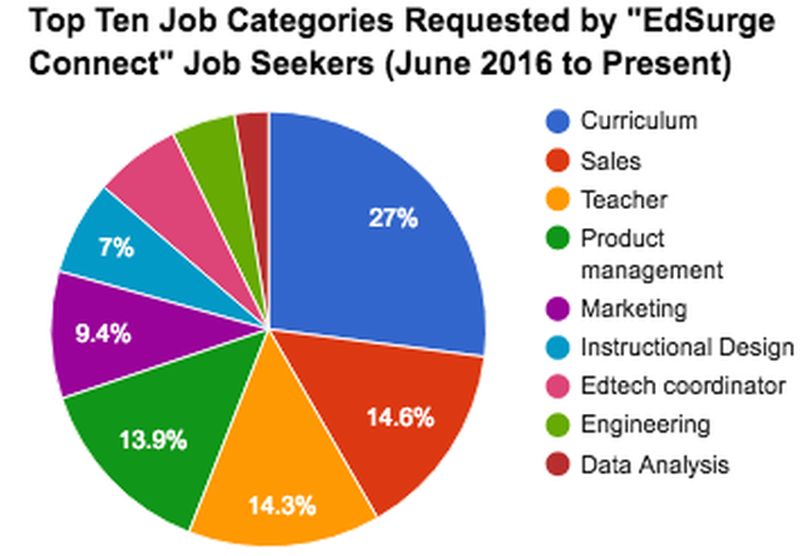Whether you’re just entering the workforce or are an educator looking to make a career change, education technology is one of the hottest fields today. According to Forbes, this market is expected to grow annually by 16.5% from 2022 to 2030. Find out more about edtech jobs, including where to find them and what you’ll need to land one.
What is edtech?
Today’s education technology, shortened to edtech, uses computer hardware and software to enhance the best education practices. It includes everything from devices and audiovisual equipment to online learning games and apps, and a whole lot more. In the last few decades, edtech has exploded into a massive industry. It’s hard to find a classroom that doesn’t use technology in one way or another these days.
Learn much more about edtech here.
This enormous sector is home to hundreds of companies, including well-known names like Google for Education, Kahoot!, BrainPop, IXL, and Thrive Academics. From small start-ups to big corporations, new education technology companies are popping up every day.
Take a look at 65 Edtech Companies Transforming the Way We Teach in 2023.
What types of jobs are available in the edtech sector?

EdSurge/EdTech Jobs via edsurge.com
Because the edtech industry is so large, the job opportunities are extremely varied. Here are some of the most common careers in education technology today.
- Instructional Designer: Also known as curriculum developers, these are the people who create educational content for online courses, apps, and games. Learn more about curriculum development here.
- Software Developer/Engineer: Working on the technical side, software developers and engineers develop, build, and maintain educational programs, apps, and games.
- Graphic Designer: These are the folks who focus on all things visual, like images, fonts, page design, and more.
- Learning Experience Designer: This job focuses on creating effective, engaging experiences for learners, using instructional design principles, user experience (UX) design, and educational psychology.
- Edtech Researcher: Researchers ensure the products companies create are effective by conducting studies and analyzing data.
- E-Learning Specialist: Specialists combine several skills, including design, development, research, and user experience.
- Virtual Reality (VR) or Augmented Reality (AR) Developer: This is one of the newer edtech jobs, with developers responsible for creative immersive educational experiences using VR/AR technology.
- Data Analyst/Data Scientist: These people work with educators and schools to make data-driven decisions that improve learning outcomes.
- Product Manager: Product managers oversee the development and management of educational technology products and platforms.
- Sales and Marketing: These are the folks who promote and sell edtech products to schools, families, and other markets.
- Edtech Consultant: Consultants help schools and other educational organizations make smart choices about technology, offering guidance and training on effective edtech solutions.
Do you need a degree to work in edtech?
Some people working in edtech earn a degree in educational technology itself. However, many companies don’t require this; instead, they look for candidates with a degree in a related field and on-the-job experience working with edtech.
The type of degree you might need for an edtech job varies. If you’re interested in working on the technical side, you might need a degree in computer programming, computer engineering, information technology, or computer science.
Other edtech jobs focus on technical writing, user experience, curriculum design and development, and pedagogy. For these jobs, you may benefit from having a degree in education, English, technical writing, curriculum development, or graphic design.
Discover more about education technology degrees here.
Can former teachers transition into edtech jobs?
Absolutely! In fact, this is a popular option for teachers who’ve decided they no longer want to work in the classroom but aren’t ready to leave education altogether. Former teachers bring real-world experience to edtech jobs, helping companies ensure their products provide true value to educators and students.
If you’re looking to transition from teaching to edtech, learn how to make your resume stand out in the corporate world here. And don’t miss this big roundup of companies that hire former teachers.
Where can I find edtech job postings?

HolonIQ/Top 100 via holoniq.com
If you’d like to work in edtech, the next stop is finding a job that’s a good fit for you. You can use job posting sites like Indeed or ZipRecruiter, but you’ll often have better luck using sites dedicated to edtech instead, including:
- EdSurge: This site’s jobs boards are regularly hailed as one of the best places to find new jobs in edtech. They’ve got a weekly newsletter you can subscribe to as well.
- ISTE: The International Society for Technology in Education, known as ISTE, has very active job boards with new postings on a regular basis. Attending their annual summer conference can also be a great way to network with edtech companies.
- Ed + Tech: This simple site posts jobs in edtech and academia. It’s not as regularly updated as some other sites, but it’s still worth keeping an eye on.
- Work in EdTech: Browse posted jobs and sign up for their weekly newsletter so you can stay on top of new opportunities as they arise.
Another option for job seekers is to visit the websites of companies you’re interested in working for to see if they have positions available. This list of top edtech companies in 2023 will help you get started.

